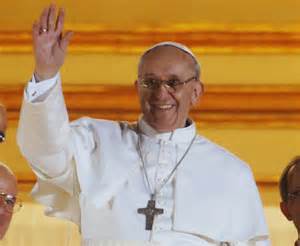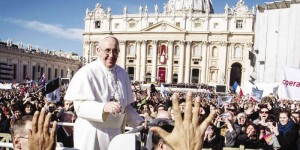Jorge Mario Bergoglio had to wait 76 years for his moment in history to arrive. Last Wednesday, March 13, 2013, it did.
The Argentine cardinal, elected as the new head of the Roman Catholic Church by his colleagues, is a breath of fresh air to a church that, despite its official membership of 1.2 billion, worldwide, sorely needed one.
Hardly anyone saw the tall, genial Bergoglio, now Pope Francis I, coming. Speculation ha d centered around an Italian cardinal (all the popes but two have hailed from that country since 1523); or possibly Cardinal Scherer, of German descent, primate of Sao Paulo, Brazil; or even a black African cardinal from Ghana. But Jorge Cardinal Bergoglio, archbishop of Argentina’s capital Buenos Aires, stepped out onto the balcony in St. Peter’s Square just after the announcement, “Habemus papam!” last Wednesday evening.
d centered around an Italian cardinal (all the popes but two have hailed from that country since 1523); or possibly Cardinal Scherer, of German descent, primate of Sao Paulo, Brazil; or even a black African cardinal from Ghana. But Jorge Cardinal Bergoglio, archbishop of Argentina’s capital Buenos Aires, stepped out onto the balcony in St. Peter’s Square just after the announcement, “Habemus papam!” last Wednesday evening.
The newly minted pope stood, seemingly at attention, arms at his sides, and his face nearly expressionless as he “showed himself” for the first time to the cheering crowd of 150,000 which had waited patiently for the white smoke to emerge from the papal chimney to indicate that the Shoes of Peter had been filled again.
When he finally began speaking, however, the crowd of Catholics from many nations was instantly charmed by his warmth and modesty. He noted that the conclave of cardinals had gone “to the ends of the earth” to find him — a joking reference to the distance of Argentina, at the south end of South America, from Rome, and an indication of his humble spirit. Later, while he and the cardinals had dinner together following his appearance on the balcony, he reportedly said (in jest) to the group, “May God forgive you” for electing him pope. The cardinals reportedly laughed heartily; he was now the pontiff, but he was reminding them that in spirit he was still just “one of the boys.”
Over the succeeding days, the new pope has gotten out of his papal jeep (no “popemobile” with bullet-proof glass for him, thank you) to greet people, kissing babies, patting little children on the head, and the like. In repose, his face is serene but a little stern; but his smile, when it comes, is as warm as the sun.
Born in Buenos Aires on Dec. 17, 1936, Francis was the son of an Italian immigrant and of a woman from Argentina who was also of Italian descent. His biographical profile which has come out already shows that in the years before he decided to attend seminary and become a priest, in 1957, he was, to use a modern American term, “a player.” An elderly Buenos Aires woman his age has said that he wrote her love letters when they were both 12 years old. He is fond of the tango, Argentina’s sensual national dance, and reportedly enjoyed performing it with young lady friends (but only until he entered seminary, obviously). He is a big fan of soccer, or “futebol” as it’s called in Spanish; it’s Argentina’s national sport, or perhaps “national obsession” would be a more fitting term.
As the archbishop of Buenos Aires, which he became in 1998, he refused to live in the palace, or mansion, the church provided for the holder of that position. Instead, he rented a small apartment in the city center, cooking at home for himself, and riding the public bus to his office each morning. Regular riders of the buses in his part of the city grew accustomed to his egalitarian ways, his companionable chatting with them while on the bus about cooking, football, and all the other things “the common people” talk about on public transportations in big cities. He was known to them, not as “Cardinal Bergoglio,” or “Your Eminence,” but as “Padre Jorge,” just as if he was their own parish priest.
The College of Cardinals, in selecting Cardinal Bergoglio as the next pope, showed that they have finally learned how to think “out of the box,” after centuries of electing no one but Italian popes. They went to the continent with the largest number of Catholics in the world, and the highest percentage of Catholics among the general population. They chose a man who appears to have all the normal appetites (and I mean that in a respectful way) that we associate with most men, tempered by the limitations he voluntarily accepted when choosing to become a priest. This is in sharp contrast to some popes of living memory, who were Italian aristocrats or, as I’ve seen one described, “a bloodless aesthetic.”
When he first appeared before the crowds in St. Peter’s Square, one week ago, one of the things that he did was lead the thousands there in reciting the “Our Father” and the “Hail Mary,” again just as a parish priest might have done. He also asked those assembled to “pray for me,” the instinctive request of a humble man. And when he preached his first homily as pope this past Sunday, which was broadcast on giant TV screens into many city centers in Argentina so that the crowds there could watch it, he went out of his way to single out his fellow Argentines by name, assuring them that though he will now be living in Rome as head of the entire Catholic Church, “I still love you very much.”
Does Francis’ humility, his obvious egalitarian instincts, his eagerness to “press the flesh” and talk with the average Catholic in the street, mean that the cardinals have elected a liberal who will bring the church “into the 21st Century” as many progressive Catholics might word it? Will he do away with much of the pomp and circumstance of the papacy, and, by extension, of those of the college of cardinals, as inappropriate in a world where many millions of Catholics are still living in poverty?
Well, it’s very possible that Francis will “lead by example” as he already has, with his “plain folks” style (think of Harry Truman, following the patrician Franklin Roosevelt). As I mentioned above, he has apparently done away with the “popemobile” with its bullet-proof glass, in favor of a slightly glorified jeep. He pointedly refused to don part of the more elegant outerwear always worn by new popes when they came out onto the St. Peter’s balcony to greet their people for the first time. He spoke to the assembled multitudes that evening only in Italian, rather than following the somewhat artificial example of former popes in saying a phrase in Latin here, one in English there, etc. We’ll wait to see just what other forms his humility will take as pope.
Francis has made it crystal clear that he identifies and sympathizes with the poor and downtrodden, the elderly, all those who are the most vulnerable in any society. That’s good, partly because it speaks volumes about his goodness as a man, and also because it reflects what Jesus meant when He said, “As ye do it unto the least of these, ye have done it unto Me.” It never hurts to be reminded that the largest Christian church in the world may need to re-examine its commitment to charity.
And the chances for “ecumenicism” seem improved greatly under the papacy of Francis. Leaders of the Protestant, Jewish, Christian Orthodox and Muslim communities in Argentina have spoken about his willingness to reach out to them, as equals albeit with different beliefs, in their predominantly Catholic country. This is a sea change from the Catholic church of not so many years ago in which no contact with, nor admission of equality with, other faiths was permitted.
But those aren’t the biggest deficits, the largest public-relations nightmares, facing the church nowadays. Pedophilia committed by priests against the parish children in their care has become a horrible dilemma, bringing down shame and blame on church leaders as well as the church itself as an institution. If I had to guess, I would say that this was a big reason for Pope Benedict XVI’s resignation, the first from the papacy in 600 years. At his age of 86, and in apparent failing health, he was just not able to deal with this monstrous blot. Francis will have to.
The child molestation scandals may well have contributed to a falling off in church membership, especially in the European countries where Christianity appears to be a dying faith. Francis’ responsibility as head of the Catholic church will include trying to win at least some of those back. His openness and willingness to be “different” from his recent predecessors are a good start to that task. But he still faces a formidable dilemma.
Francis’ history as a cleric shows that he will not bend on things that he believes to be traditional church doctrine, such as opposition to abortion, gay marriage, and contraception. He spoke out strongly in opposition when Argentine president Cristina Fernandez de Kirchner was pushing gay marriage for that country, through its congress in 2010. He also opposed her campaign to provide “free” contraception to all Argentines. Needless to say, Francis is not one of Kirchner’s favorite churchmen — although she was the first head of state to come forward to greet him after his inauguration, and she appeared to be “greatly moved” by the experience, according to the news media.
Clerical celibacy, which I personally believe has contributed greatly to the child molestation scandal among priests, may be another story. It was imposed on the Catholic clergy in about the 12th Century by the pope of that day, so it is not part of the church’s history or doctrine going back to its earliest days. Eastern Orthodox clergy always have been allowed to marry, provided that they do it before taking their final vows in seminary, and provided that they are content to remain parish priests and not advance into the church hierarchy. Perhaps Francis will decide on a re-thinking of the celibacy issue. In addition to contributing (in my opinion) to the problem of pedophile priests, I believe it has been a factor in the decline in the number of young Catholic men entering the seminary in recent years.
Pope Francis is the first of his line to choose that name as pontiff. It is assumed that, given his concern for the poor and his simple lifestyle, he chose the name in honor of St. Francis of Assisi, famed for his caring for animals, among other humanitarian things. It could also be that the former Cardinal Bergoglio, being a Jesuit, chose the name in honor of St. Francis Xavier, the founder of the Society of Jesus.
As far as I’ve heard, Francis has been smart enough to leave the reasons for his choice ambiguous. For to be the leader the church needs at this time in history, he will need the heart and humanity for which St. Francis of Assisi was venerated; and the intellect for which the Jesuits are known.
Brains, and heart: A good combination for any leader.



4 comments for “Pope Francis a unique man with big challenges”